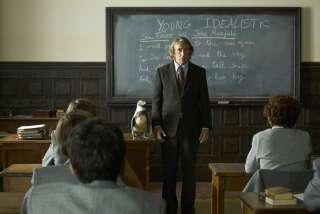A bird’s-eye view of San Francisco
- Share via
“Regard ca,” look at this, the French tourist on San Francisco’s Telegraph Hill says to his young daughter. The next word needs no translation: “Wow.”
The tourists are looking at Mark Bittner, and, as Judy Irving’s charming and surprisingly emotional documentary “The Wild Parrots of Telegraph Hill” makes clear, he is well worth looking at.
A bearded man in a worn jean jacket, his hair tied back in a ponytail, Bittner is surrounded by 40 to 50 birds. Not just any birds, but cherry-headed conures, lime-green parrots with the reddest of tops. They sit on his arms and his head and peck at his glasses, they eat seeds out of his hand, they are completely at home with him and he with them.
“How long have you owned them?” is the obvious first question. He doesn’t own them at all, Bittner replies, they’re their own birds, wild as the jungles they usually inhabit. But Bittner has a passion for these parrots, he’s taken the time to painstakingly befriend them, and “Telegraph Hill” takes you into his world as completely as he has gone into theirs.
Although it’s only 83 minutes long, “The Wild Parrots of Telegraph Hill” is as much about human nature as it is about the avian kind. You not only learn more than you’d think there was to know about bird psychology but also about the hard-earned life experiences of a seeker after truth, San Francisco style, who found wisdom and love in the unlikeliest places.
That would be Bittner, who -- though he says, “I don’t think of myself as an eccentric” -- easily fits that description. A former street musician who has fashioned his life into a spiritual journey rather than a quest for material success, Bittner has mastered urban survival skills to the point where he can make it in the city as a housesitter without any visible means of support.
Because the Telegraph Hill neighborhood where he lived in the shadow of Coit Tower had the kind of lush vegetation that attracted the parrots, Bittner became intrigued with them. And because he turned out to be an acute observer with a wry and intelligent point of view, his voice-over narration is filled with involving ideas about the parrots and their world.
Since he had the time to watch the birds (likely the offspring of freed or escaped pets) for several hours a day over the course of six years, Bittner was gradually able to differentiate among them to the point of giving each a name and a reconstructed life story.
There was, for instance, the contrarian Mingus, named after the jazz musician and the only bird who wanted to stay inside Bittner’s house; Pushkin, a feathered womanizer who stole other birds’ mates; and Connor, one of the oldest birds in the group and, as the only blue-crowned conure, a true outsider.
While this may sound like the anthropomorphizing of innocent feathered bystanders, director Irving, who last did a six-film documentary series on the Bay Area’s wildlife, has gotten vivid footage that shows the birds acting as advertised.
And Bittner himself has written in the book version of “Wild Parrots” that, unlike what you might expect, his experience with the parrots cured him of “anthropocentrism, which is seeing human beings as the center of the universe. The parrots broke through that illusion.”
It is the emotional intensity of Bittner’s experiences with parrots, experiences so strong and moving that he himself wonders “how do you get so attached to an animal?” that form one of the keys to “Wild Parrots’ ” appeal.
The other key is the benefits documentary filmmakers get when they shoot over a long period of time, in this case more than five years. “Wild Parrots” benefits greatly from a confluence of gradually unfolding events that takes it to places neither the subject nor the filmmaker could have anticipated.
“It wasn’t a plan; it just happened,” Bittner says of his life with the birds. The mellow, serendipitous “The Parrots of Telegraph Hill” is here to show you just how magical happenstance can be.
*
‘The Wild Parrots of Telegraph Hill’
MPAA rating: G
Times guidelines: Nothing objectionable
A Shadow Distribution release. Producer-director-editor Judy Irving. Cinematographers Judy Irving, James Attwood, Howard Munson, Mark BIttner, Jacquelyne Cordes. Music Chris Michie. Running time: 1 hour, 23 minutes.
Exclusively at the Landmark Nuart, 11272 Santa Monica Blvd., West Los Angeles, (310) 281-8223.
More to Read
Only good movies
Get the Indie Focus newsletter, Mark Olsen's weekly guide to the world of cinema.
You may occasionally receive promotional content from the Los Angeles Times.










